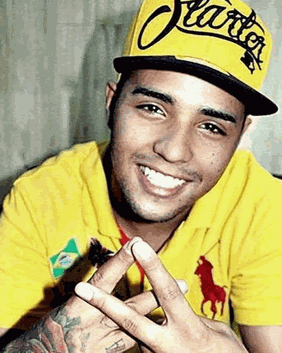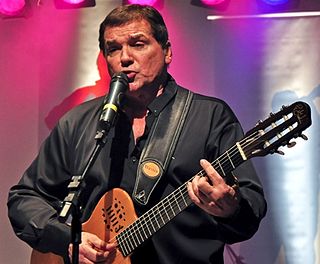Related Research Articles

Roberto Carlos Braga is a Brazilian singer-songwriter, also known as "King of Latin Music" or simply "the King". Most of his songs were written in partnership with his friend Erasmo Carlos. Roberto Carlos has sold over 70 million albums around the world. He is considered one of the most influential artists in Brazil, being cited as a source of inspiration by many artists and bands. His net worth is estimated at US$160 million.
Brazilian rock refers to rock music produced in Brazil and usually sung in Portuguese. In the 1960s, it was known as iê-iê-iê, the Portuguese transcription of the line "Yeah, yeah, yeah" from the Beatles song "She Loves You".

Juca Chaves was a Brazilian comedian, singer and writer well known for his irreverence.

Erasmo Carlos was a Brazilian singer and songwriter, most closely associated with his friend and longtime collaborator Roberto Carlos. Together, they created many chart hits including "É Proibido Fumar", "Sentado à beira do caminho", "Além do Horizonte", "Amigo" and "Festa de Arromba".

Wanderléa Charlup Boere Salim is a Brazilian singer and former co-host of the historic television show Jovem Guarda alongside Roberto Carlos and Erasmo Carlos. The show aired on TV Record between 1965 and 1968. Wanderléa was nicknamed Ternurinha after her first hit "Ternura".

Jovem Guarda was primarily a Brazilian musical television show first aired by Rede Record in 1965, although the term soon expanded to designate the entire movement and style surrounding it. The members of the program were singers who had been influenced by the American rock n' roll of the late 1950s and British Invasion bands of the 1960s, although the music often became softer, more naïve versions with light, romantic lyrics aimed at teenagers. They were Roberto Carlos, Erasmo Carlos and Wanderléa, with other bands and musicians appearing on the show as guests.

Ciro Pessoa Mendes Corrêa, also known by his Dharma name Tenzin Chöpel, was a Brazilian singer-songwriter, lyricist, guitarist, screenwriter, journalist and poet, famous for being one of the founding members of the influential rock band Titãs and for his later work with pioneering post-punk/gothic rock band Cabine C. He also formed numerous other short-lived and lesser known projects throughout the early to mid-1990s before beginning a solo career in 2003.

Carlos Oscar Reichenbach Filho was a Brazilian filmmaker.
Paulo Afonso Miessa, better known by his stage name Paulo Goulart was a Brazilian actor.
Tonico e Tinoco were a Brazilian música sertaneja duo from the state of São Paulo, composed of brothers Tonico and Tinoco, they are regarded among the most famous and prolific artists in sertanejo. With their first hit single, "Chico Mineiro" (1946), they were named "A Dupla Coração do Brasil". They performed more than 40,000 times between 1935 and 1994, recorded more than 1,000 songs and sold over 150 million albums despite never performing outside of Brazil.
John Herbert was a Brazilian actor, director and producer.
Ondino Sant'Anna known artistically as Dino Santana, was a Brazilian actor and brother of the famous comedian Dedé Santana. He is most known for his role of supporting character in the Brazilian comedic series Os Trapalhões and some of its films. He suffered from prostate cancer and died in 2010.

Antônio de Carvalho Barbosa, known professionally as Tony Ramos, is a Brazilian actor.

Larissa Manoela Elias Frambach is a Brazilian actress, singer, writer, model, voice actress and businesswoman, one of the most famous children's and teen audiovisual celebrities, having built a successful career in television, film and streaming since childhood, and she had more than 50 million followers online.

Daniel Pedreira Senna Pellegrine, better known by his stage name MC Daleste, was a Brazilian funk paulista singer, songwriter and rapper.

O Bidú: Silêncio no Brooklin is the fifth studio album by Brazilian singer-songwriter and guitarist Jorge Ben. It was recorded with Brazilian rock band The Fevers as Ben's backing musicians and released in 1967 by Artistas Unidos, a small-market record label based in São Paulo.

Ettore Maria Fizzarotti was an Italian film director and screenwriter.

Jerry Adriani was a Brazilian singer, musician and actor. He began his career in television while working with Rede Tupi in São Paulo. His early work included his time as vocalist with the ensemble Os Rebeldes.
Marcos Roberto Dias Cardoso, also known as Marcos Roberto was a singer and Brazilian composer, successful since the 1960s and in the 1980s with the song A Última Carta, which was in first place on the charts for months and sold more than 2 million records.
Calypso, Brega Calypso or just Brega-pop, is a Brazilian musical genre that emerged in the Brazilian city of Belém, by mixing elements of Pará's regional genres such as lambada, carimbó, guitarrada, siriá, with international music from Caribbean countries, such as calypso, ska, reggae. It developed in the 1990s at concerts and dances in nightclubs on the outskirts of town and through street vendors promoting the production of small local/independent musicians.
References
- ↑ "A Ilha dos Paqueras". IMDb .
- ↑ "Corrida em Busca do Amor". IMDb .
- ↑ "Sinal Vermelho - as Fêmeas". IMDb .
- ↑ Archived 2015-07-11 at the Wayback Machine .